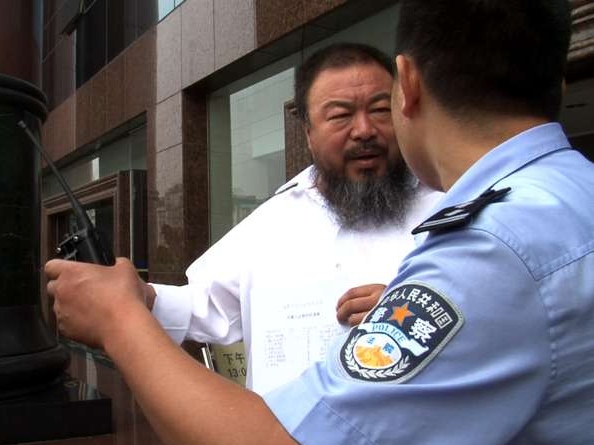It’s fitting that “Ai Weiwei: Never Sorry” was released on the opening day of the 2012 LondonOlympic Games.
Ai, the film’s subject, gained international recognition for his involvementin designing Beijing’s “Bird’s Nest” Olympic stadium. But he threw away his societal winningsto instead draw attention to the devastating May 2008 Sichuan earthquake which killed more than 70,000 Chinese in China’s Sichuan province.
His efforts got him arrested, beaten, censored -and a fan following worthy of a rock star and befitting one of China’s most outspoken freedomfighters.
“Never Sorry,” documents Ai’s life – from his father’s own persecution in China during the riseof Communism, to a decade that Ai spent in New York City during his college years and throughtoday – casing it within the confines of Ai’s exhibits and activism.
It’s a collage of photos, filmand tweets, capturing Ai’s activism, art and personal life. Director, producer and cinematographerAlison Klayman’s portrait is a compelling look at a man who is truly risking everything to fightfor the country he loves.
Ai’s art is worthy of the celebration it receives. There’s a certain confrontational beauty andvulgarity to it. For example, one of Ai’s works is a Coca-Cola logo painted on an ancientChinese vase. In another, he videotapes himself smashing a similar ceramic. These representthe destruction that happens in China daily that no one thinks about. The government destroysold buildings and no one stops them. Mao destroyed the art of ancient China. Ai finds worth init. It’s just one area where he differs drastically from the government he challenges.
He’s oftenseen flashing the middle finger in front of important Chinese buildings. It’s his M.O., and a boldstatement in his suppressed country.It’s understandable why Ai is so upset. The Sichuan earthquake was truly devastating, andKlayman includes footage from the earthquake’s aftermath in her film to illustrate it: desperatechildren, bloody women, massive destruction. More than 5,000 of the victims were childrenwho perished in poorly built schools. Ai worked to identify the children who died, something thegovernment was uninterested in doing, and saw as a subversive act. Ai posted a list of the children’snames and birthdays on his blog in May 2009, the one-year anniversary of the quake. For such asimple act, his blog was shut down and his home was monitored with cameras.
Ai exists in a world where at any moment he could be snatched. In one scene, Klaymancaptures a dinner outing, where Ai eats outside with his team. Numerous Chinese stop by to sayhello. A few join him for dinner. In China, this is a significant act of defiance. Chinese policeshow up with cameras rolling. Ai’s crew turns its own cameras on the police and films themfilming the dinner. Once, a police cameraman and Ai’s cameraman both train their camerason each other. Ai calmly eats through it all. When an officer asks him to leave for causing adisturbance, he graciously tells the officer he will move inside after they finish the course theyare currently eating.
The filmmakers include footage of Ai being assaulted by police in a hotel. The attack is in thedark, and mostly conveyed through the voices of those involved. Later, Ai filed a complaint withthe authorities. His team films it. Ai knows nothing will come of it, and even winks at the cameraas he makes his complaint, but as The New Yorker’s Evan Osnos notes, “You can’t just say thatthe system is flawed. You have to work through the system and show it in all its detail, and that’sthe only way you can ultimately make a critique.”
Ai later tweeted, “For each person to earnestly cherish their rights is the essence of civil society.We just made a bit of progress today.”

He’s a hero in his country, and around the world, but he’s not perfect. Interviews with formercollegues, friends, his wife, his mother and his lover – the mother of his son – prove it. Of thesituation with his wife and son’s mother, Ai said, “It’s not desirable but it happens.”For the second anniversary of the earthquake, Ai and his team asked followers from around thecountry to read a name from the list aloud and send the recording to them. Ai said that it was likea training for the activists – teaching them how to record, upload and distribute content, whilealso serving the purpose of honoring the dead children on the second anniversary of their death.
The Chinese government hasn’t just let Ai get away with his actions. Last year, Chineseauthorities held Ai in an undisclosed location for 81 days. Not long after being released hewas again speaking out. Then the Beijing tax authorities hit him with a huge tab, saying heowed 15 million yuan (more than $2 million) for tax evasion in 2011. In the first 24 hours after thepronouncement, Chinese citizens contributed over one million yuan to help foot the bill. On July20 of this year, a Chinese court rejected Ai’s appeal, upholding the fine. Such a ruling mightcrush other artists. I doubt it will stop Ai.
ArtReview magazine named Ai the world’s most powerful artist in 2011. Ai said of the honorthat maybe being powerful means to be fragile. But fragility doesn’t mean you’re alone. Evena sheet of paper, stacked with others, cannot be torn. His Tate Modern show in London was anexample of that. It was a room covered with millions of hand-painted porcelain sunflower seeds,representing the diversity in China if you look closely enough. When people walked on it, itrepresented the suppression of China. But it also represents the sheer overwhelming number ofthe Chinese commoners. If they rise, no one will be able to stop them.

COMMENTS
Please let us know if you're having issues with commenting.